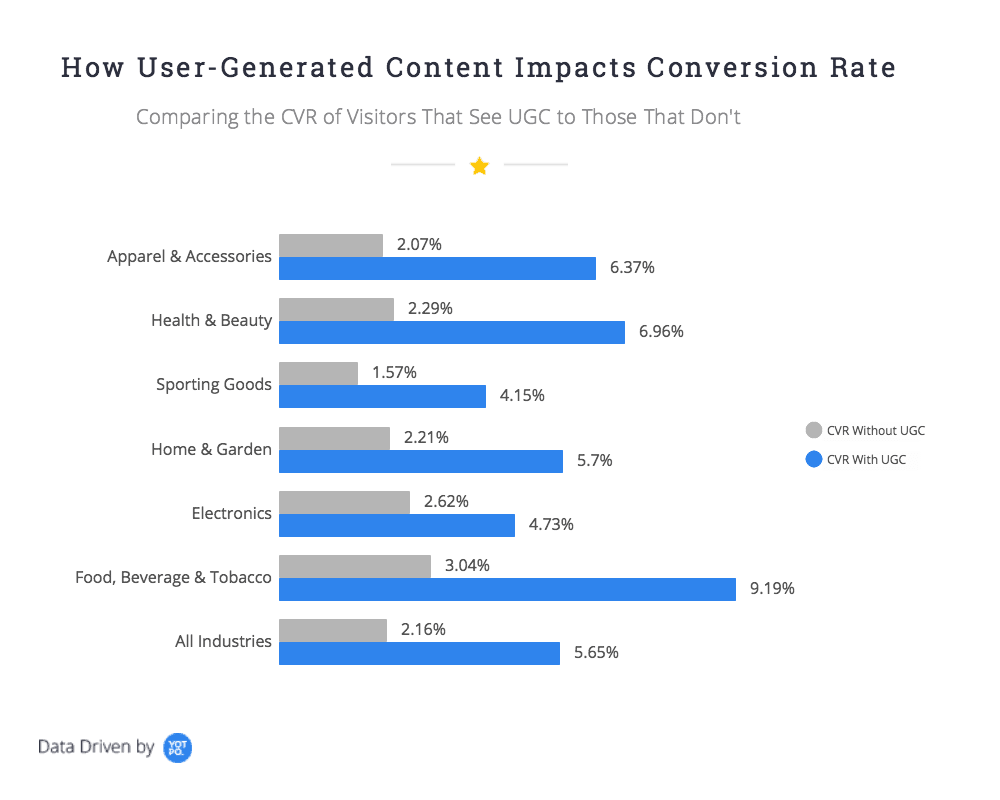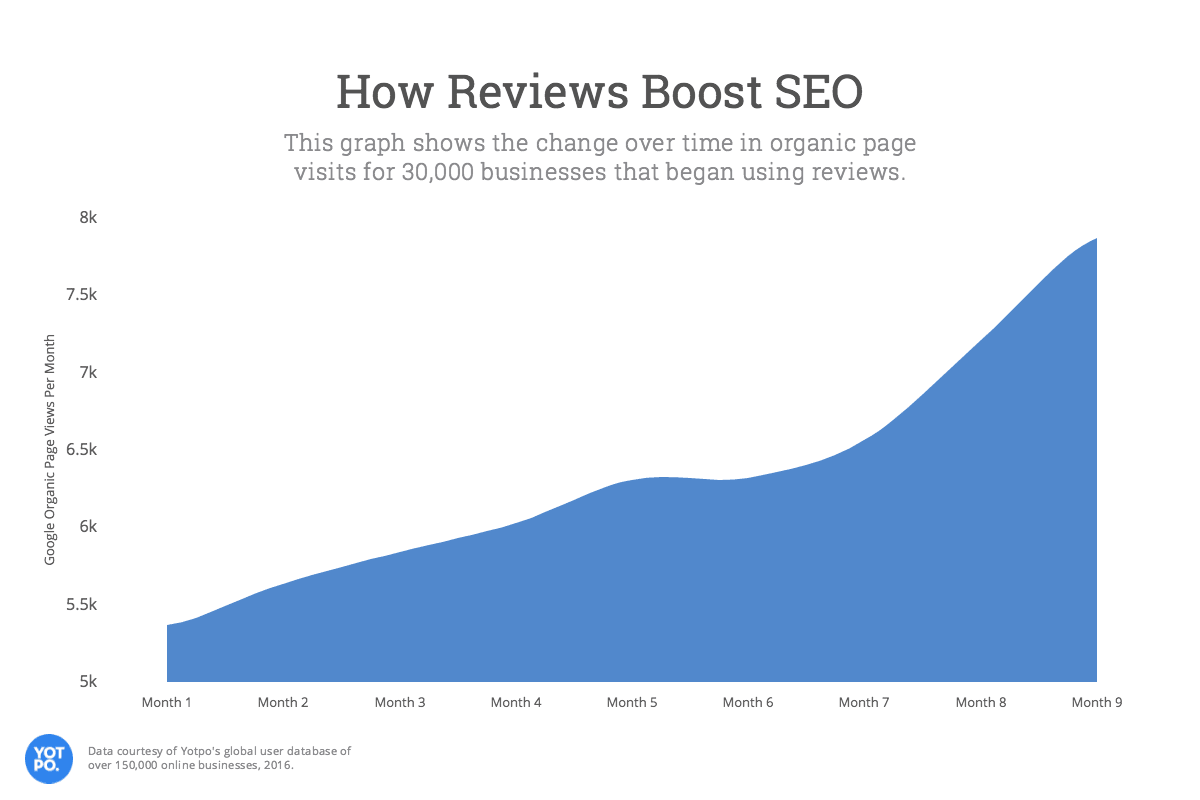Consumers make the best marketers.
In fact, according to BrightLocal, 88 percent of consumers trust online reviews written by other consumers as much as they trust suggestions from their personal network.
But why does marketing that leverages user-generated content (UGC) work? Why do consumers have a higher affinity to follow the advice of other customers?
At its core, UGC is effective as it elicits a psychological response called social proof, which makes people assume that others’ actions reflect correct behavior for a situation. For example, if we see someone slip on a puddle and fall, we’ll likely avoid walking in that area.
We’re also influenced by others’ advice. Even if we didn’t see someone slip and fall, if a friend warns us that a specific walkway is slippery, we are likely to believe them and take their advice. Why? If we do not have knowledge about a particular subject, we’re more open to accepting the opinions of our peers.
From a customer point of view, social proof helps to increase conversion rates by building trust.
A brand could tell you their products are great, but the sentiment would be much more believable coming from someone outside of the organization.
In other words, shoppers on your site know that you’ll say your products are awesome, but what’s going to get them to convert is knowing that real people are buying and using your products.
In fact, Yotpo (disclosure: I work for the company) analyzed numbers from 200,000 e-commerce stores and 163 million orders to gauge UGC’s impact on conversion rates, and we found that overall, across all industries, people who look at UGC are converting 161 percent more than people who are not looking at UGC:

As more digital-native brands launch and disrupt their respective markets, and as more established brands fortify their websites against the erosive and corrosive powers of Amazon, trust is going to become even more paramount to their ultimate success.
Because UGC has the ability to provide social proof in every single part of the buyer journey, it offers marketers a major opportunity to drive more traffic to their direct commerce sites and ultimately boost sales.
Start Your Search Engines
For a fair portion of the connected world, Google is the first stop in the buying journey.
To gauge how impactful customer opinion about a brand is on SEO rankings, we analyzed 500 sites that leveraged customer reviews to track their SEO rankings.

We found that organic page visits greatly increased over the span of nine months by simply adding customer reviews to website pages:
Google favors UGC. During an AMA with Google’s John Mueller, he mentions the usefulness of user-generated content as a way to build greater context – and content.
5 Reasons Why UGC Benefits SEO
1. UGC Provides Search Engines with New & Relevant Content
Brand content marketing has increasingly created a lot of noise and consumers have become wise to the practice, making it less effective.
Additionally, ideating and creating targeted new content for SEO consumes a lot of resources and might not yield intended results.
There is a high need for authentic content that resonates equally with your shoppers and search engines.
Collecting UGC is a lean way to address this need with unique and authentic content.
Because this content is generated by customers, brands don’t have to use much of their own resources to build this out.
The practice of deploying UGC demonstrates that brands aren’t just talking at customers, but that customers have a way to dialogue with the brand.
For marketers, the SEO results are unrivaled with other marketing tactics.
2. UGC Shapes Basic SEO Attributes Naturally
Sites are optimized for search engines through a system of basic attributes including keywords, titles, backlinks, and internal links.
When it comes to reviews, customers do all the work while shaping SEO with appropriate links and keywords.
Because customer testimonials tend to be product-centric, customers often include phrases and links associated with the product that help naturally strengthen SEO.
3. UGC Naturally Helps Your Site Rank for Long-Tail Keywords
Long-tail keywords are specific search phrases with low search competition that are much easier to rank highly for.
These keywords consist of phrases that users search for but brands may not think to include in their consumer marketing.
For instance, a beauty retailer may have optimized one of its products for “Skin Cleanser,” but if they’re facing a large amount of competition for this keyword, it makes it difficult to rank high.
Conversely, “skin cleanser for darker skin tone,” may have much less competition and be searched by users with a specific intent to find and buy this product.
Your users, by posting what they love about your product, can give insight into how your audience talks about their pain points and what they search for.
And knowing which long-tail keywords resonate with shoppers makes a huge difference as it enables brands to unify customer opinion as keywords for on-site SEO.
4. UGC Boosts Social Optimization
UGC helps SEO through social media optimization (SMO) on visual platforms such as Instagram and informational platforms such as Facebook and Twitter.
UGC gives social media managers new types content to fill a professional images void.
Sharing your customer photos or reviews instills greater trust with your followers, increasing the likelihood of shares, likes, and comments.
More engagement generally means increased traffic from potential new customers looking for a similar experience. For example, topics that relate with users in a brand’s social footprint will likely rise to their attention.
5. UGC Is Ideal for Automatic & Manual Optimization
Automated search engine algorithms use spiders that look for customer product reviews and testimonials to evaluate a website.
Additionally, companies like Google employ search quality raters to manually evaluate a site’s reputation to rate for key tenets like mastery of the topic, authority of the author, and truthfulness in content, which can easily be obtained from your customers’ content.
Content submitted by your customers gives marketers a legitimate shot to earn SEO points from both from quality rating systems.
This tactic should be a vital part of any SEO checklist, as reviews and ratings can make it easier to provide exceptional results to search engine queries.
Word-of-Mouth Marketing Powers SEO
In addition to increasing conversion rates, boosting customer trust and powering word-of-mouth marketing, UGC helps brands get more traffic from search engines.
With the customer buying journey largely starting on Google, it’s important for brands to leverage one of their strongest marketing tools – UGC – to establish social proof and effectively power SEO.
More SEO Resources:
- How Brands Use User-Generated Content: 3 Interesting Examples
- Why Authentic Content Marketing Matters Now More Than Ever
- How to Balance Free & Premium Content With SEO
Image Credits
In-post images via Yotpo, used with permission.





![[SEO, PPC & Attribution] Unlocking The Power Of Offline Marketing In A Digital World](https://www.searchenginejournal.com/wp-content/uploads/2025/03/sidebar1x-534.png)